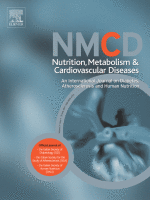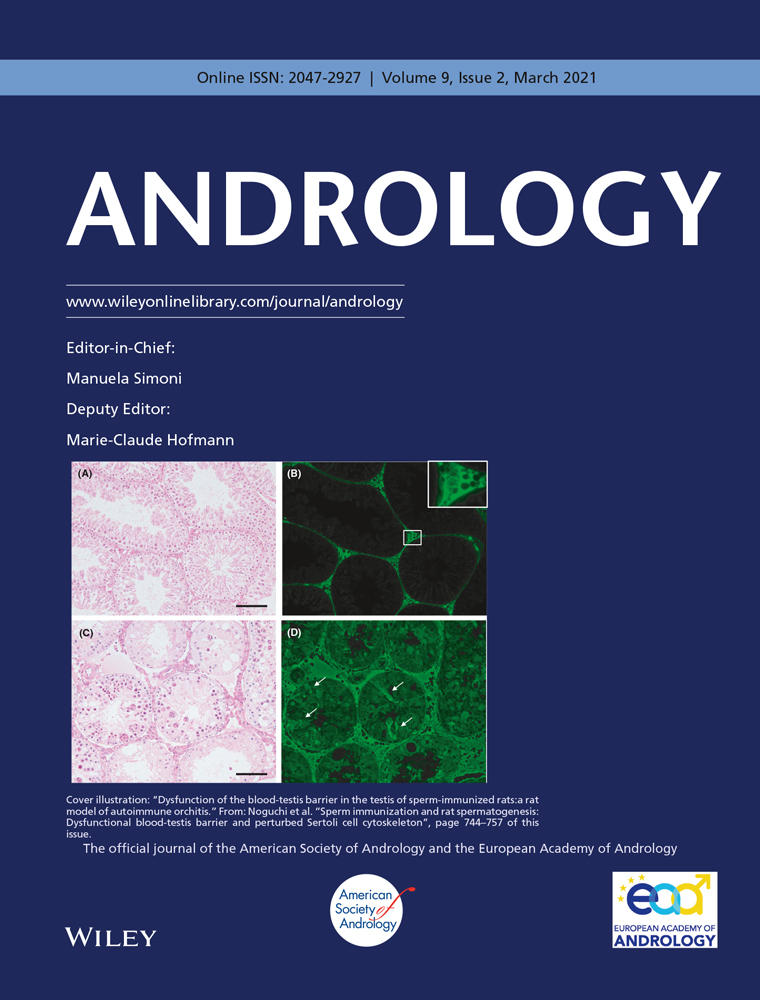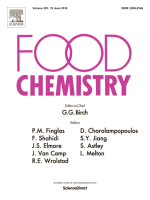Hazelnut
How to submit an article:
- Registered users can submit any published journal article that has a unique DOI (Digital Object Identifier) name or link to Research Hub.
- For example, you can paste the full DOI link:
https://doi.org/10.1109/5.771073or just the DOI name:10.1109/5.771073into the field above and click submit. - The person who is first to submit a valid article to Research Hub will forever be credited for it, and every article submission earns you +6 Research Points.
Published research studies are articles that present the findings of original research that has undergone a peer-review process and has been made publicly available in scholarly journals, books or other media.

The effects of foods on LDL cholesterol levels: A systematic review of the accumulated evidence from systematic reviews and meta-analyses of randomized controlled trials
2021 May Nutrition, Metabolism and Cardiovascular Diseases Schoeneck M, Iggman D
Systematic Review Turmeric Walnut Avocado Tumeric Almond Green Tea Tomato FlaxseedConsumption of certain foods like rapeseed/canola oil, avocados, and turmeric can lead to moderate to large reductions in LDL cholesterol levels.

Sperm DNA methylation changes after short‐term nut supplementation in healthy men consuming a Western‐style diet
2020 Nov 03 Andrology Salas‐Huetos A, James ER, Salas‐Salvadó J, Bulló M, Aston KI, Carrell DT, et al.
Randomised Controlled Trial Hazelnut Sperm Quality WalnutIncorporating tree nuts into a Western-style diet subtly modifies specific DNA methylation regions within sperm, thereby showing parts of the sperm epigenome can respond to dietary changes.

Does ‘activating’ nuts affect nutrient bioavailability?
2020 Jul Food Chemistry Kumari S, Gray AR, Webster K, Bailey K, Reid M, Kelvin KAH, et al.
Experimental Study Clinical Study Bioavailability Activating Nuts NutsSoaking nuts doesn't increase the bioavailability of their nutrients, instead, it reduces the mineral concentration, particularly in chopped nuts.

Hazelnut consumption improves testicular antioxidant function and semen quality in young and old male rats
2019 Oct Food Chemistry Kara H, Orem A, Yulug E, Yucesan FB, Kerimoglu G, Yaman SO, et al.
The present work suggests that hazelnut supplemented diet significantly improves testicular antioxidant function and semen quality in old male rats.
Animal Study Male Fertility HazelnutResearch insights are moderated by the Research Hub team and offer an at-a-glance overview of interesting research findings.

2021 Nutrition, Metabolism and Cardiovascular Diseases
Consumption of certain foods like rapeseed/canola oil, avocados, and turmeric can lead to moderate to large reductions in LDL cholesterol levels.
Systematic Review Almond Avocado Flaxseed Green Tea Tomato
The effects of foods on LDL cholesterol levels: A systematic review of the accumulated evidence from systematic reviews and meta-analyses of randomized controlled trials
Schoeneck M, Iggman D

2020 Andrology
Incorporating tree nuts into a Western-style diet subtly modifies specific DNA methylation regions within sperm, thereby showing parts of the sperm epigenome can respond to dietary changes.
Randomised Controlled Trial Sperm Quality Walnut
Sperm DNA methylation changes after short‐term nut supplementation in healthy men consuming a Western‐style diet
Salas‐Huetos A, James ER, Salas‐Salvadó J, Bulló M, Aston KI, Carrell DT, et al.

2020 Food Chemistry
Soaking nuts doesn't increase the bioavailability of their nutrients, instead, it reduces the mineral concentration, particularly in chopped nuts.
Experimental Study Activating Nuts Bioavailability Nuts
Does ‘activating’ nuts affect nutrient bioavailability?
Kumari S, Gray AR, Webster K, Bailey K, Reid M, Kelvin KAH, et al.
Review Articles
Review articles summarise and critically evaluate the current state of research on a specific topic or field by synthesising multiple primary research studies.
Clinical Trials
Clinical trials are research studies that involve people and are conducted to evaluate the safety and efficacy of new treatments or interventions, such as drugs, medical devices, or behavioural therapies.
Study Protocols
Published study protocols are detailed plans that outline the objectives, methodology, statistical analyses, and organisation of a research study that have been made publicly available for others to review and use as a reference.
Presentation Slides

Systematic Review
Consumption of certain foods like rapeseed/canola oil, avocados, and turmeric can lead to moderate to large reductions in LDL cholesterol levels.
Schoeneck M, Iggman D

Randomised Controlled Trial
Incorporating tree nuts into a Western-style diet subtly modifies specific DNA methylation regions within sperm, thereby showing parts of the sperm epigenome can respond to dietary changes.
Salas‐Huetos A, James ER, Salas‐Salvadó J, Bulló M, Aston KI, Carrell DT, Jenkins TG

Experimental Study
Soaking nuts doesn't increase the bioavailability of their nutrients, instead, it reduces the mineral concentration, particularly in chopped nuts.
Kumari S, Gray AR, Webster K, Bailey K, Reid M, Kelvin KAH, Tey SL, Chisholm A, Brown RC
Executive Summary
Write an executive summary in the form of a blog article on the topic of "Research into Chinese medicine treatment for Hazelnut" summarising the research below and using language that can be easily understood by patients and avoiding medical jargon using a professional and caring tone of voice.
Write an executive summary in the form of a blog article on the topic of "Researched Chinese medicine treatments for Hazelnut" summarising the research below in an objective and easy to understand way, and using language that can be easily understood by patients. Group the article into Chinese medicine treatments first, followed by nutrition and other treatments. Avoid using medical jargon and use a professional and caring tone of voice.
Write me a concise but easy to understand executive summary on the topic of "Chinese medicine treatments for Hazelnut" based on the following research that I will give you. Your summary should be 2 paragraphs long in Australian English spelling and include references to the studies.
A Systematic Review published in 2021 in the journal Nutrition, Metabolism and Cardiovascular Diseases found that Consumption of certain foods like rapeseed/canola oil, avocados, and turmeric can lead to moderate to large reductions in LDL cholesterol levels. The research was carried out by conducting a systematic evaluation of existing guidelines, systematic reviews, and Randomised Control Trials (RCTs); we have only referred to the latter for studies on coffee intake. This was done on databases such as PubMed, Cochrane Database of Systematic Reviews, and Cochrane Central Register of Controlled Trials, alongside a search on the Trip database for guidelines. The time frame for the study was from its inception up until June 2019 and October 2019 respectively. Studies were included if they were at least 13 days in duration and were in English. Using the Grading of Recommendations Assessment, Development, and Evaluation (GRADE) method, 37 guidelines, 108 systematic reviews, and 20 RCTs were evaluated to analyze the strength of evidence in the context of food impacts on LDL cholesterol levels. The results of the research reveal that foods high in unsaturated and low in saturated and trans fatty acids such as rapeseed or canola oil, those with added plant sterols/stanols, and those high in soluble fibre like oats, barley and psyllium cause moderate reductions in LDL cholesterol. A moderate to a large increase was observed with unfiltered coffee though. Soy protein, tomatoes, flaxseeds, and almonds cause small reductions. Meanwhile, foods like avocados and turmeric cause moderate to large reductions with a moderate level of evidence supporting this observation. Other foods like pulses, hazelnuts, walnuts, high-fiber/wholegrain foods, green tea result in small to moderate reductions, and sugar causes a small increase. Several foods identified were either neutral or had low or very low evidence regarding their effects on LDL cholesterol levels.
A Randomised Controlled Trial published in 2020 in the journal Andrology found that Incorporating tree nuts into a Western-style diet subtly modifies specific DNA methylation regions within sperm, thereby showing parts of the sperm epigenome can respond to dietary changes. The study methodology involved a post hoc analysis with a subset of the participants (healthy, non-smoking, and young) from the FERTINUTS 14-week randomized-controlled, parallel trial. The selected participants were from the pool of individuals who completed the entire dietary intervention trial. These individuals were split into two groups: the nut group, which consumed 60 grams per day of mixed nuts for 14 weeks, and the control group, who maintained their regular Western-style diet devoid of nuts. Investigation of the trial's results revealed no significant changes in overall methylation between the two groups. However, for the nut group, there were 36 genomic regions distinctly showing differential methylation between the beginning and end of the trial with a marked increase in methylation. No such changes were identified in the control group. Analysis also involved examining if nut consumption led to changes in the epigenetic age of cells, but no significant differences were discovered.
A Experimental Study published in 2020 in the journal Food Chemistry found that Soaking nuts doesn't increase the bioavailability of their nutrients, instead, it reduces the mineral concentration, particularly in chopped nuts. The study examined the effects of different soaking regimes on the phytate and mineral concentrations in whole and chopped almonds, hazelnuts, peanuts, and walnuts. Four treatments were employed: raw, soaking for 12 hours in salt solution, soaking for 4 hours in salt solution, and soaking for 12 hours in water. To analyze phytate concentrations, high-performance liquid chromatography was used and the mineral concentrations were evaluated by inductively coupled plasma mass spectrometry. In the evaluation of the results, it was observed that the differences in phytate concentrations between treated and untreated nuts were minimal, ranging from -12% to +10%. On the other hand, the soaking process resulted in diminished mineral concentrations, notably for chopped nuts. Furthermore, there were no improvements noted in the phytate:mineral molar ratios as a result of the soaking technique. Therefore, this study effectively disproves the notion that 'activating' nuts yields a greater nutrient bioavailability.
Moderation Tools
Topic
Sign In
Users not signed in are limited to viewing the 5 most recent items of content.